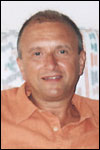
|
ABOUT US
ACADEMIC RESOURCES
LIBRARY RESOURCES
PUBLICATIONS
DIGITAL PROJECTS
GRANTS & SCHOLARSHIPS
LINKS
|

|
Zygmunt G. Baranski
Professor Baranski is one of the world's authorities on Dante, medieval poetics, and modern Italian literature, film and culture. Recent books include 'Chiosar con altro testo'. Leggere Dante nel Trecento. (Florence: Cadmo, 2001); Dante e i segni. Saggi per una storia intellettuale di Dante (Naples: Liguori, 2000); Cambridge Companion to Modern Italian Culture (Co-editor Rebecca West. Cambridge: Cambridge University Press, 2001); Pasolini Old and New. Surveys and Studies. (Editor. Dublin: Four Courts Press, 1999). Professor Baranski's visiting professorship at Notre Dame during the fall of 2004 was co-sponsored by the Devers Program in Dante Studies, the Medieval Institute and the Department of Romance Languages and Literatures. He taught a graduate seminar titled "Dante's World of Books" and an undergraduate course on Italian film: "Italian Cinema: The Realities of History." ROIT 515 — DANTE'S WORLD OF BOOKS "Dante's World of Books" aimed to examine the oeuvre and career of, arguably, the most original and influential writer in Western culture from three closely interlinked perspectives. First, the course provided an overview of all Dante's writings, the books he actually produced. Second, it explored his intellectual formation and his attitude towards the literary tradition-the books that were probably present in his 'library'. Third, it assessed the manner in which Dante synthesized his different ideological and poetic interests in order to develop an incisive and powerful assessment and critique of humanity's position in the order of divine creation. In the Middle Ages, the created universe was often metaphorically described as "God's book" or the "book of creation". The course thus investigated the complex inter-relationship that Dante forged between his books and the 'book' of the Supreme Artist, a popular and highly influential medieval image for God the Creator. FTT/ROIT/LLRO 452i — ITALIAN CINEMA: THE REALITIES OF HISTORY This course explored the construction and development of the Italian cinematic realist tradition from the silent era to the the early 1970s, although its primary focus was on the period 1934-1966, which stretches from the appearance of Blasetti's openly fascist 'historical' reconstruction, "La vecchia guardia", to Pasolini's 'eccentric' exercise in left-wing commitment, "Uccellacci e uccellini", with its mix of expressionist and hyper-realist techniques. At the centre of this period are found some of Italy's most highly regarded films made by directors, such as Vittorio De Sica, Roberto Rossellini, and Luchino Visconti, who belonged to the Neo-realist movement (1945-53). These film-makers rejected escapist cinema and tried to make films that examined the contemporary experiences of ordinary Italians. As well as analysing the films in themselves, the course examined the formal and ideological continuities and differences between Neo-realist films and their silent and fascist predecessors. In a similar way, it analysed Neo-realism's impact on later film-makers, such as Federico Fellini, Pietro Germi, Pier Paolo Pasolini, Gillo Pontecorvo, Dino Risi, and Francesco Rosi, who attempted to develop new versions of cinematic realism. Finally, the course aimed to locate the films in their historical and cultural contexts and to address theoretical issues arising from the concept of 'realism'.
HOME > ACADEMIC RESOURCES > VISITING PROFESSORS > FALL 2004: ZYGMUNT BARANSKI |


